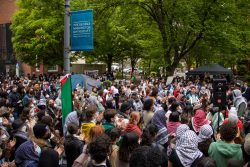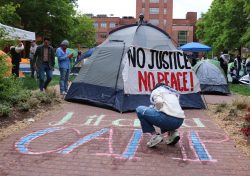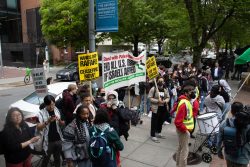Georgetown University’s Academic Working Group, which was formed last year as part of the school’s Diversity Initiative, has divided students and faculty alike with its recommendation that the University institute a diversity requirement. Some students and faculty believe the requirement will help spur dialogue and expose students to ideas they wouldn’t otherwise encounter, but others argue it would limit students’ academic freedom and further burden students struggling to fulfill their core requirements.
While none of the Academic Working Group’s other recommendations, which include hiring more minority faculty and creating an African-American Studies major, have caused as much debate as the diversity requirement, they received a great deal of attention at the open forum hosted by the Academic Working Group on Wednesday.
The students who attended the forum urged the working group to push for the quick implementation of its recommendations. All the students who spoke at the forum made statements in favor of the working group’s recommendations.
What wasn’t as evident at the forum was the level of criticism the diversity requirement has sparked from both students and faculty. At an earlier open forum held last week, several professors questioned whether the requirement would limit students’ academic freedom, and at last week’s meeting of the Georgetown University Student Association Senate, two senators called for a vote to endorse some of the working group’s recommendations but not the diversity requirement.
Critics of the proposed requirement argued that it could limit students’ academic freedom, directing them into classes that dealt with diversity issues while preventing them from pursuing other classes that might interest them more.
Dean James Reardon-Anderson, a School of Foreign Service senior associate dean and director of undergraduate programs, said he opposes the diversity requirement as it has been presented by the Academic Working Group.
“I do not think the curriculum should include any required course designed to convey or promote any particular social value,” Reardon-Anderson wrote in an e-mail.
Reardon-Anderson said that there were dozens of values worth promoting and celebrating, such as honesty, justice, and individual rights, but that he saw no reason to include any of them as part of the required curriculum.
Professor George Shambaugh, who attended the first open forum, said that while he supported efforts to bring diversity into the classroom, he has doubts about the efficacy of a diversity requirement.
“I think the idea of increasing the diversity of the faculty is a good idea, but its not clear to me that a diversity requirement is the best way to accomplish the working group’s goals,” Shambaugh said.
Brian Kesten (COL ’10), who served on the working group, argued that compared to its competitors, Georgetown lags behind in encouraging students to take classes that deal with diversity issues. He noted that schools like the University of Pennsylvania, Columbia University, and Dartmouth University, already have general education diversity requirements and also offer majors in Latino and African-American Studies.
Asked about the potential burden on students this requirement could entail, members of the working group said the idea of an additional burden was a misconception.
Jheanelle Brown (SFS ’10), who served on the working group, said that as an overlay requirement, the diversity requirement would not actually force students to take any additional classes. For example, one class could fill both the diversity requirement and an English requirement.
Supporters of the requirement feel that while it may not necessarily change students’ views, it will at least expose students to new ideas and perspectives.
“It will cause you to think differently,” GUSA Senator Jon-Matthew Hopkins (COL’13) said. “Not to change how you feel but to cause you to look at things in a different way.”
Hopkins said he had spoken with some of his constituents and found that many of them were actually excited about the prospect of a diversity requirement.
The Academic Working Group’s recommendations still have a long way to go before they become University policy. According to Kesten, the recommendations will first have to be reviewed by the Main Campus Faculty Executive, and then the Curriculum Committees of all four schools before being recommended to the deans. The recommendations would then be reviewed by the provost and then the university president, who has the power to enact the recommended changes to the curriculum. (xanax)
“We haven’t changed the [core] curriculum in 40 years,” Kesten said. “This is a long process.”




